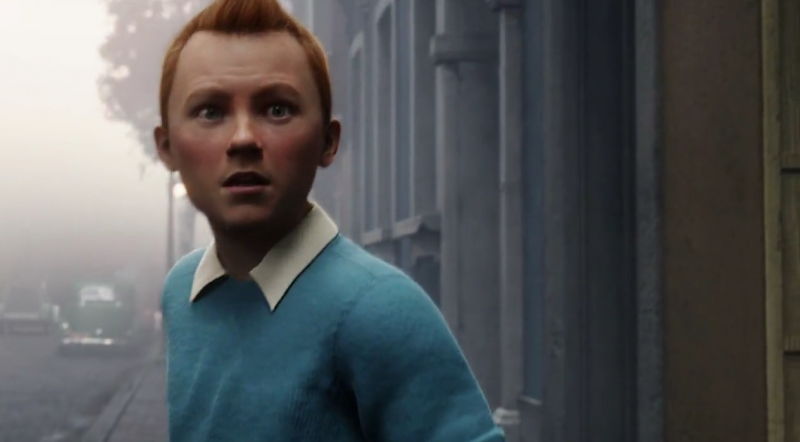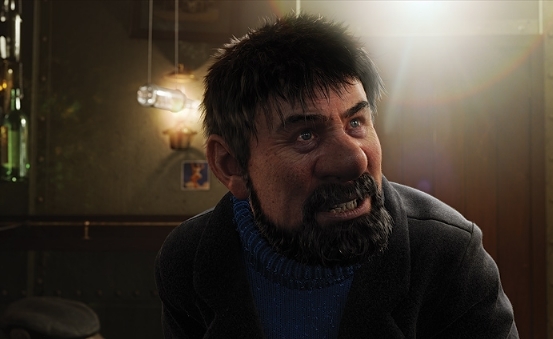The Adventures of Tintin: The Secret of the Unicorn | reviews, news & interviews
The Adventures of Tintin: The Secret of the Unicorn
The Adventures of Tintin: The Secret of the Unicorn
Indiana Jones with a strawberry blond quiff: Spielberg leaves his mark, but not fatally

It’s been a long time coming, and an extremely nervous wait for millions of fans who grew up on the boy reporter and his alliterating whisky-soaked maritime sidekick. Steven Spielberg first acquired the cinematic rights to The Adventures of Tintin in 1982, the year ET came out. In the interim he’s gone off on tangents featuring war and genocide, dinosaurs and sci-fi. They’ve all been thrillingly different, but all clearly bearing Spielberg’s kitemark.
The answer is in two parts. He’s certainly mucked about - this is not quite Hergé as anyone knows it. But not, in the view of this overgrown Tintin fan, detrimentally.
Let’s start with the fidelities. Everything that was originally thrilling and entertaining about Tintin is pretty much intact. Thus we have a ripping boy’s own yarn featuring the hunt for three model galleons, each concealing a piece of parchment which together will reveal the coordinates of a haul of treasure lost at sea centuries ago. That’s more or less as Hergé wrote it, give or take.
The most overt departure involves elaborations on the source material
As for the participants, the daring young hero with a zest for adventure and his fearless pooch Snowy have been beautifully animated in the halfway-house style which finds actors lurking just beneath the surface of CGI drawings. The technique has never been seen to better effect. Jamie Bell nicely convinces as a half-human, half-avatar Tintin – though pedants may be disconcerted at the Aryan blueness of his eyes. Andy Serkis is a robust Captain Haddock (pictured below) who has acquired a reeky new Scottish accent.
 Meanwhile, of the supporting cast, Thomson and Thompson (Simon Pegg and Nick Frost, or possibly the other way round) have been splendidly kitted out with bulbous noses. Haddock’s old disloyal first mate, to give but one example from the bit-part players, looks remarkably like his 2D cartoon version. Best of all is Bianca Castafiore, the Milanese Nightingale with a voice that, in a key scene, can shatter the thickest glass. There is no Professor Calculus. (I was never a fan.)
Meanwhile, of the supporting cast, Thomson and Thompson (Simon Pegg and Nick Frost, or possibly the other way round) have been splendidly kitted out with bulbous noses. Haddock’s old disloyal first mate, to give but one example from the bit-part players, looks remarkably like his 2D cartoon version. Best of all is Bianca Castafiore, the Milanese Nightingale with a voice that, in a key scene, can shatter the thickest glass. There is no Professor Calculus. (I was never a fan.)
As for the infidelities, so long as you can accept that Tintin and co are not exact simulacra of their cartoon templates, the most overt departure involves elaborations on the source material. The Secrets of the Unicorn, as all Hergé scholars will attest, is actually two books grafted into one story, the prequel being Red Rackham’s Treasure. It may be enough for two whole books but has been deemed insufficient for one animated epic. So the plot has been as diligently plumped as a pre-Christmas goose, and most of the padding comes in the shape of action. Lashings of it.
The cinemascopic Sahara interlude is no doubt a directorial nod to David Lean
If slightly too copious, the action sequences make for bravura stuff. There's a wonderful flight sequence in a seaplane running low on gas, and a frantic motorbike/car chase through the steep streets of a teeming Moroccan port. It's only by the time you get to the finale, with Haddock and his nemesis Sakharine (Daniel Craig, minus cheekbones and pecs) facing each other at the controls of giant portside cranes like two saurians auditioning for Jurassic Park 4, that set-piece fatigue has taken over.
It’s worth saying what it’s an improvement on. There’s more and better duelling than in the dreadful Three Musketeers. The seamless flashbacks to Haddock’s ancestor Sir Francis on the Unicorn also knock spots off the Pirates of the Caribbean franchise. Spielberg has set his sights higher. A lovely scene with the slumbering seamen slithering across their bunks in the swell is vintage Disney. The cinemascopic Sahara interlude is no doubt a directorial nod to David Lean and Lawrence of Arabia.
 The film’s other pleasures are not only verbal and visual but also, it must be said, musical: the soundtrack is essential John Williams. On top of the largely British cast, the scriptwriting team features a trio of DreamWorks newbies: Steven Moffat, a canny writer of sitcom farce nowadays known for Doctor Who, Edgar Wright who gave us Shaun of the Dead and Hot Fuzz, and Joe Cornish, responsible for the excellent Attack the Block. That’s quite a team of populist wits to have in your corner; although not exactly Belgian, their Briticisms give the film the right European sensibility. For the most part the script plays it straight, though someone has oddly managed to smuggle a bestiality joke under the radar: a character refers to sacking a shepherd “on account of his animal husbandry”.
The film’s other pleasures are not only verbal and visual but also, it must be said, musical: the soundtrack is essential John Williams. On top of the largely British cast, the scriptwriting team features a trio of DreamWorks newbies: Steven Moffat, a canny writer of sitcom farce nowadays known for Doctor Who, Edgar Wright who gave us Shaun of the Dead and Hot Fuzz, and Joe Cornish, responsible for the excellent Attack the Block. That’s quite a team of populist wits to have in your corner; although not exactly Belgian, their Briticisms give the film the right European sensibility. For the most part the script plays it straight, though someone has oddly managed to smuggle a bestiality joke under the radar: a character refers to sacking a shepherd “on account of his animal husbandry”.
As importantly, the script team have all got first-class degrees cum laude in Spielberg Studies. What they essentially give us - in what will no doubt be the first of at least three Tintin movies - is Indiana Jones with a strawberry blond quiff. (The quiff even prowls through the sea at one point like the animatronic star of a previous Spielberg movie). In short, the greatest entertainer on the planet has remade a bygone hero in his own image, but it's safe to go in the water. No need to thunder those typhoons or blister any barnacles.
- The Adventures of Tintin: The Secret of the Unicorn is on general release from Wednesday, 26 October
Watch the trailer to The Secret of the Unicorn
rating
Explore topics
Share this article
Add comment
The future of Arts Journalism
You can stop theartsdesk.com closing!
We urgently need financing to survive. Our fundraising drive has thus far raised £49,000 but we need to reach £100,000 or we will be forced to close. Please contribute here: https://gofund.me/c3f6033d
And if you can forward this information to anyone who might assist, we’d be grateful.

Subscribe to theartsdesk.com
Thank you for continuing to read our work on theartsdesk.com. For unlimited access to every article in its entirety, including our archive of more than 15,000 pieces, we're asking for £5 per month or £40 per year. We feel it's a very good deal, and hope you do too.
To take a subscription now simply click here.
And if you're looking for that extra gift for a friend or family member, why not treat them to a theartsdesk.com gift subscription?
more Film
 The Other Way Around review - teasing Spanish study of a breakup with unexpected depth
Jonás Trueba's film holds the romcom up to the light for playful scrutiny
The Other Way Around review - teasing Spanish study of a breakup with unexpected depth
Jonás Trueba's film holds the romcom up to the light for playful scrutiny
 The Road to Patagonia review - journey to the end of the world
In search of love and the meaning of life on the boho surf trail
The Road to Patagonia review - journey to the end of the world
In search of love and the meaning of life on the boho surf trail
 theartsdesk Q&A: actor Emma Mackey on 'Hot Milk' and life education
The Anglo-French star of 'Sex Education' talks about her new film’s turbulent mother-daughter bind
theartsdesk Q&A: actor Emma Mackey on 'Hot Milk' and life education
The Anglo-French star of 'Sex Education' talks about her new film’s turbulent mother-daughter bind
 Blu-ray: A Hard Day's Night
The 'Citizen Kane' of jukebox musicals? Richard Lester's film captures Beatlemania in full flight
Blu-ray: A Hard Day's Night
The 'Citizen Kane' of jukebox musicals? Richard Lester's film captures Beatlemania in full flight
 Hot Milk review - a mother of a problem
Emma Mackey shines as a daughter drawn to the deep end of a family trauma
Hot Milk review - a mother of a problem
Emma Mackey shines as a daughter drawn to the deep end of a family trauma
 The Shrouds review - he wouldn't let it lie
More from the gruesome internal affairs department of David Cronenberg
The Shrouds review - he wouldn't let it lie
More from the gruesome internal affairs department of David Cronenberg
 Jurassic World Rebirth review - prehistoric franchise gets a new lease of life
Scarlett Johansson shines in roller-coaster dino-romp
Jurassic World Rebirth review - prehistoric franchise gets a new lease of life
Scarlett Johansson shines in roller-coaster dino-romp
 theartsdesk Q&A: director Andreas Dresen on his anti-Nazi resistance drama 'From Hilde, with Love'
The East German-born filmmaker explains why his biopic of the activist Hilde Coppi isn't bound to the 1940s
theartsdesk Q&A: director Andreas Dresen on his anti-Nazi resistance drama 'From Hilde, with Love'
The East German-born filmmaker explains why his biopic of the activist Hilde Coppi isn't bound to the 1940s
 Chicken Town review - sluggish rural comedy with few laughs (and one chicken)
A comedy great gets lost in an English backwater
Chicken Town review - sluggish rural comedy with few laughs (and one chicken)
A comedy great gets lost in an English backwater
 F1: The Movie review - Brad Pitt rolls back the years as maverick racer Sonny Hayes
Joseph Kosinski's motorsport spectacle delivers bang for your buck
F1: The Movie review - Brad Pitt rolls back the years as maverick racer Sonny Hayes
Joseph Kosinski's motorsport spectacle delivers bang for your buck
 Bleak landscapes and banjos: composer Bernard Hughes discusses his score for 'Chicken Town'
Our critic talks about his recent film project
Bleak landscapes and banjos: composer Bernard Hughes discusses his score for 'Chicken Town'
Our critic talks about his recent film project

Comments
I really hope he doesn't
"What they essentially give